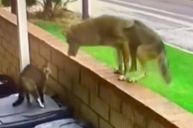It's safe to say that mistakes were made. An animal control agent accidentally shot and killed a man's beloved dog after mistaking it for a coyote in a sad case of mistaken identity.
The animal's owner is angry and fed up after the accidental slaying. On Tuesday, police responded to a call of a coyote in someone's backyard, according to Timothy Labrie, chief of police in Northbridge, Massachusetts. An animal control agent arrived and searched the surrounding woods. That's when he came across a dog that he thought was a coyote.
The officer immediately pulled his weapon and shot and killed the animal. After further examination, the officer determined that it was actually a dog that had a flea collar. The animal's owner, Kirk Rumford, was understandably angry. The husky, named Odin, was less than a year old. Rumford didn't understand why the officer immediately resorted to violence.
Dog Mistaken For Coyote
He also doesn't understand how the officer mistook his dog for a coyote.
"My dog would have been the most gorgeous coyote ever, on steroids," Rumford said. "It's huge compared to that. Look at pictures of what a coyote looks like in Massachusetts and my dog. My dog was beautiful. He looked like a wolf if anything, and there are no wolves in Massachusetts."
Rumford remembered Odin as loveable and a knucklehead who played with other dogs. But Labrie said that it was a honest mistake. He said the department won't discipline the officer.
He said, "We do have leash laws. At the end of the day if you can keep your fenced-in areas secure, keep an eye on your dog, do whatever methods that you can use to keep your dog in your yard," Labrie said. "And also if your dog tends to wander in the woods, I would definitely have identifying markers on them."
The shooting happened as an increase in coyote sightings has people on edge. "Intensive coyote removal can obviously reduce populations in the short-term, but removal can also result in younger coyote populations with higher reproduction and immigration rates," Remington Moll, an assistant professor of natural resources at the University of New Hampshire, said in a statement.




